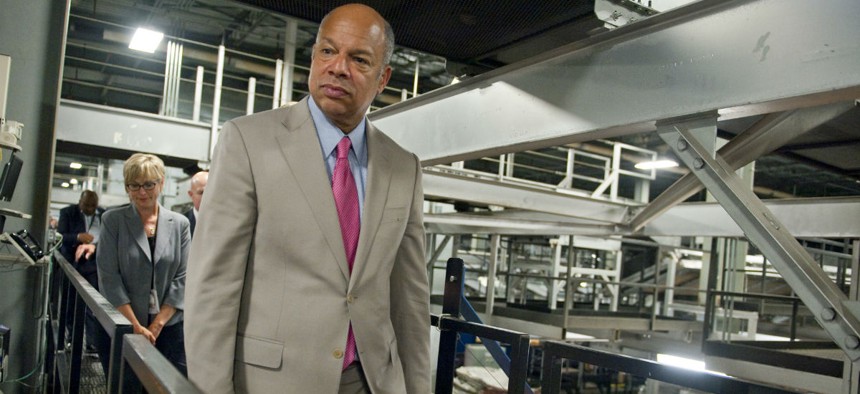
House members are growing impatient with DHS Secretary Jeh Johnson's ongoing "Unity of Effort" initiative. Johnson is shown here touring an automated package handling facility in Kentucky last summer. Barry Bahler/DHS
Lawmakers Aim to Streamline Homeland Security Purchasing
Bipartisan bill was prompted by cost estimates for buys that rose by $10 billion.
The third-largest federal agency needs to streamline its acquisition process and address continuing reports of waste, a bipartisan group of House members said Monday.
In introducing a bill (H.R. 2199) to step up oversight and strengthen the ability of top procurement officials to re-work contracts, leaders of the House Homeland Security Committee expressed impatience with Homeland Security Secretary Jeh Johnson’s ongoing “Unity of Effort” initiative. They also called for “clarity” for U.S. businesses that contract with DHS.
“Congressional watchdogs continue to find failures in how DHS spends billions of taxpayer dollars on its major acquisition purchases,” said Rep. Scott Perry, R-Pa., chairman of the Oversight and Management Efficiency Subcommittee. “Frontline operators securing our borders, defending our shores, and protecting our aviation systems should not wait years longer than promised for systems that don’t perform as intended.”
Ranking Member Rep. Bennie Thompson, D-Miss., agreed, saying, “Congress continues to see unmistakable signs that the Department of Homeland Security has not yet tackled serious problems with acquisition management. How the department invests in the capabilities that front-line operators need for their critical missions needs reform and better oversight. Major acquisitions must produce better results both in terms of affordability and effectiveness.”
The bill grew out of an April 22 hearing at which the Government Accountability Office reported that, on average, DHS buying programs are more than three-and-a-half years late in meeting key objectives, while cost estimates for selected programs rose by 40 percent, or almost $10 billion.
At that hearing, Chip Fulghum, acting DHS deputy undersecretary for management, acknowledged the need for improvement. But he testified that “the department has worked diligently to improve its acquisition processes and these efforts have produced more effective governance and significant improvements to … acquisitions. For example, we have established metrics to track program health, compliance with processes and policies, and program staffing.”
Fulghum added: “In recent years, the Acquisition Review Board has increased its oversight reach and has taken action to cancel or pause several poor-performing or higher-risk programs that were not achieving the pre-established cost, schedule and performance goals.”
The DHS Acquisition Accountability and Efficiency Act would:
- Authorize the department’s chief acquisition officer, the undersecretary for management, to approve, halt, modify or cancel major acquisition programs as needed;
- Require every major acquisition program to have an approved Acquisition Program Baseline document;
- Codify the Acquisition Review Board and require the board to validate the documents -- including the Acquisition Program Baseline -- and review the cost, schedule and performance objectives of major acquisitions;
- Require a multiyear acquisition strategy in each Future Years Homeland Security Program;
- Authorize the chief procurement officer to serve as the main liaison to industry and to oversee a certification and training program for DHS’s acquisition workforce;
- Compel DHS to submit to Congress major acquisition programs that fail to meet cost, schedule or performance metrics through quarterly status and accountability reports;
- Direct the department to find ways to streamline the acquisition process and strategically address issues regarding bid protests without creating any new offices or programs; and,
- Instruct DHS to eliminate unnecessary duplication.
GAO in May 2014 credited DHS with some improvements in acquisition that might help get the department off the high-risk list. In the acquisition area, “DHS has made progress in initiating efforts to validate required acquisition documents,” a report said. But half of major programs “lack an approved baseline, 77 percent lack approved life-cycle cost estimates and the department has not implemented its acquisition policy consistently,” GAO said.
NEXT STORY: Obama to Letterman: Let's Get More Veterans Jobs







